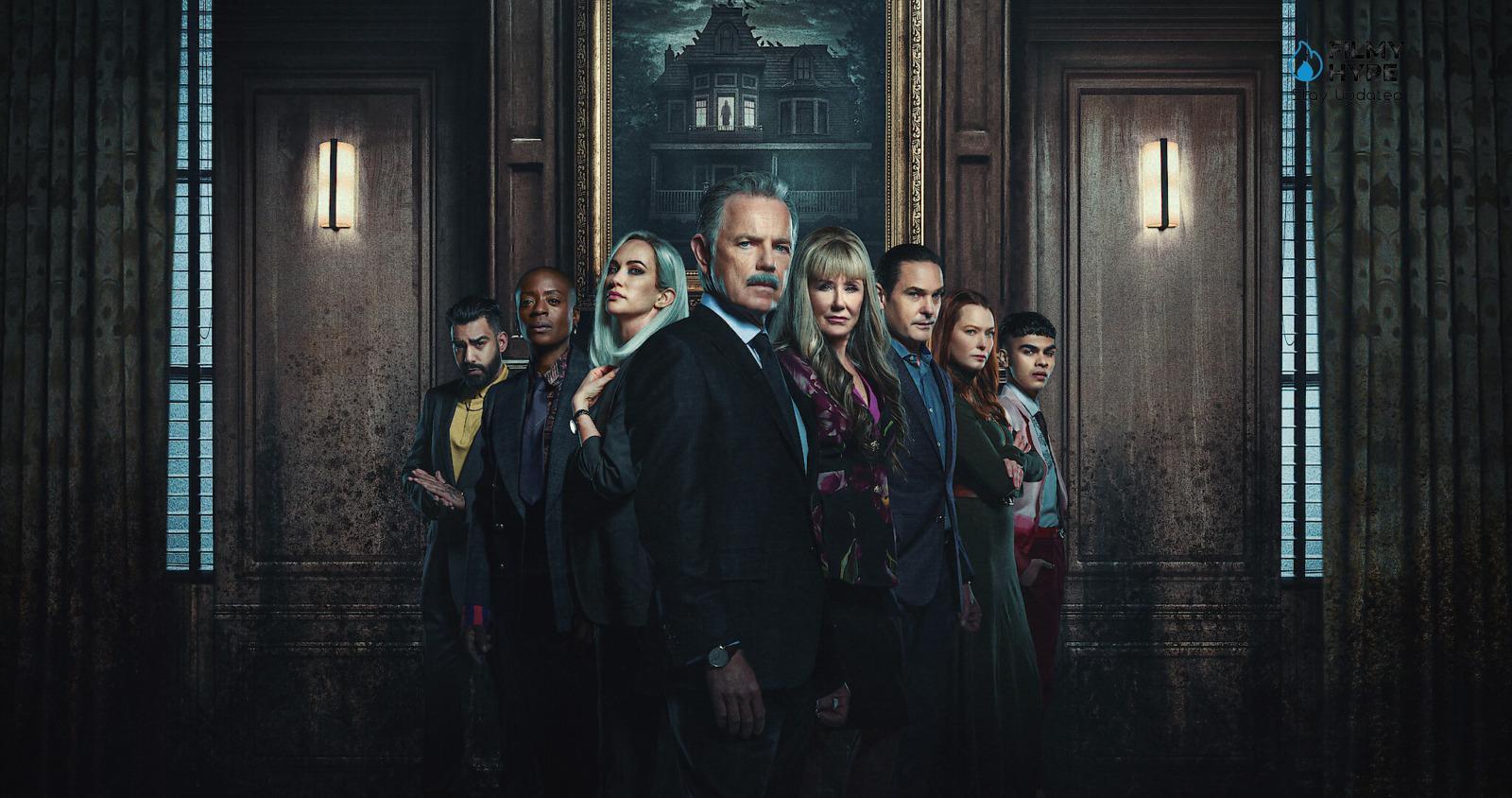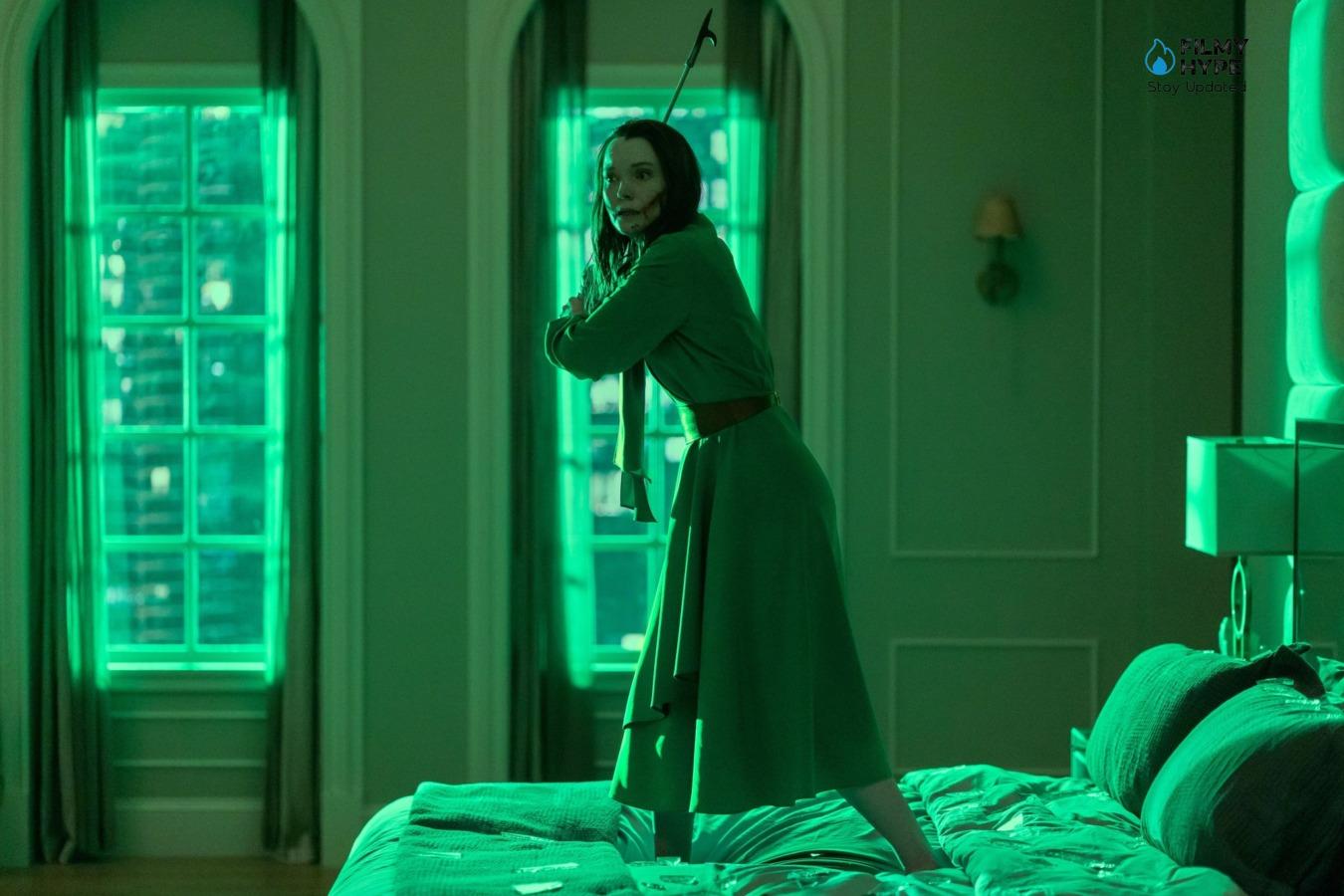The Fall of the House of Usher Review: One of His Most Complex, Interesting And Terrifying Works Mike Flanagan
Cast: Bruce Greenwood, Mary McDonnell, Carla Cugino, Henry Thomas, Kate Siegel, Rahul Kohli
Created By: Mike Flanagan
Streaming Platform: Netflix
Filmyhype.com Ratings: 4/5 (four stars)
A new TV series not to be missed has arrived on Netflix. It is an 8-episode horror series by Mike Flanagan The Fall of the House of Usher ready not only to give you shivers but to push you into a very profound reflection on the meaning of life. You will surely have heard of its title, after all its story dates back to 1839 when one of the most famous poets and writers of the 19th century, Edgar Allan Poe, conceived, wrote, and published it in the form of a story. And if you’ve never read it, Netflix has made it accessible in the form of a story through images and given it new light to make it shine again and give it the notoriety it deserves. Thus, The Fall of the House of Usher has arrived on the streaming platform’s catalog in a television adaptation by Mike Flanagan, its director, editor, screenwriter, and producer. When thinking about the most prolific showrunners of recent years, it’s really hard not to mention Mike Flanagan. The author who brought to life some of the greatest Netflix originals, such as The Haunting of Hill House, The Haunting of Bly Manor, and Midnight Mass, has earned the public’s trust with successes, to the point of winning over the master of the thrill himself, Stephen King.

After having collaborated on the film adaptation of Doctor Sleep (sequel to The Shining), the famous author decided to rely on Flanagan for his most ambitious project: adapting the imposing saga of The Dark Tower for TV. However, this feat will not happen on Netflix’s behalf. Flanagan has recently signed an exclusive agreement with Prime Video and will soon say goodbye to the platform that made him famous in the eyes of the general public. Before doing so, however, the showrunner allowed himself one last effort, an absolute synthesis of his style and at the same time creative innovation by his standards. At the top of the Netflix releases for October, The Fall of the House of Usher therefore arrives in the catalog with the weight of very high expectations. Making the most of their talent to tell a story that is much more real (and current) than usual, this very interesting production not only highlights the skills of one of the most skilled authors around but secures a place among the best series of the year.
The Fall of the House of Usher Review: The Story Plot
Their story is told by Roderick to District Attorney Auguste Dupin (Carl Lumbly) in the old house where he grew up with Madeline. The man’s six children – from five different mothers – died within a few days, and Fortunato is on the verge of disaster: the authorities have discovered that the painkiller known as Licodone, the company’s flagship product, company, causes strong addiction, and many of its users have died of overdoses. Fortunato was aware of this, but she always kept it under wraps, just like the Sackler family did with OxyContin, one of the most sensational scandals in recent years in the medical field. If you have seen All the Beauty and the Pain, a documentary by Laura Poitras that won the Golden Lion in Venice in 2022, you know what I am referring to: The Fall of the House of Usher takes inspiration from the opioid crisis in the United States, which is believed Sacklers’ Purdue Pharma contributed. In a similar context, Roderick retraces the strange deaths of his children, all linked by the presence of a mysterious woman called Verna (Carla Gugino).
Along the lines of Edgar Allan Poe’s original story, the plot of The Fall of the House of Usher takes place, for the most part, in the old family home of Roderick (Bruce Greenwood) and Madeline Usher (Mary McDonnell), CEOs of one of the largest – if not the largest – and controversial US pharmaceutical companies. A series of tragic events strike the Usher family, decimating it, and the head of the family, Roderick, tired, afflicted and ill, decides to make amends with his best enemy: the ex-journalist and lawyer C. Auguste Dupin (Carl Lumbly), who tried with all his might to bring down the Ivory Tower of the Ushers, complicit in being, with their opioid-based drugs, one of the main causes of death in America.

What is staged is a real journey into the origins of the family and their empire, between past and present, poverty and wealth, a sense of revenge and hypocrisy, resentment and remorse. Dupin will listen to every single word of the delirious and feverish confession of the entrepreneur on his way into the sunset, without understanding whether it is yet another mockery or whether the madness caused by mourning has completely devoured him; Roderick will become increasingly aware that he is the cause of his evil, that he, long ago, started a real massacre, selling the “soul” of an entire generation of Ushers in exchange for absolute candies. But now, like any self-respecting agreement, the time has come to settle the bill.
The Fall of the House of Usher Review and Analysis
By entirely writing all the episodes and directing some of them himself, the showrunner has created something new and different from his previous works. Despite subtle inflections in terms of pace, as often happens to Flanagan’s works due to their verbosity, or even some less impactful sensation compared to his more memorable works, the author of Hill House and Midnight Mass managed to overcome the burden of the past and to find the ideal way to welcome modernity by immersing oneself in the chaos of worldly society. As he has demonstrated several times in recent years, Flanagan knows perfectly how to play with fear and horror, but above all how to keep the viewer glued to the screen. To do so, the showrunner not only outdid himself in authorial terms but also benefited from the maximum support of an extremely varied cast: Almost all the best performers who took part in his previous works found themselves under the Usher banner, with the addition of some surprising innovations.
It is an extremely rare phenomenon these days, but The Fall of the House of Usher manages to present one of the best ensembles of recent times, featuring a sensational Carla Gugino, probably giving her most impressive performance and a Bruce Greenwood from Emmy. In the gaze of the protagonists, themes of brotherhood, love, and disappointment are crowded, immersed in the horror of contemporaneity. The characters and power dynamics show a less ancestral terror on paper and therefore tremendously more palpable. Edgar Allan Poe turns out to be a dispenser of ideas and details that Flanagan molds to his liking like clay, shaping his creature according to his needs. In a story that follows the author’s classic stylistic features, between impressive monologues and a horror that disturbs the viewer between peaks and abysses, the cast and script make the development of the work profoundly elegant and articulated.

Without considering the gems for the more curious readers, it should be noted that Usher doesn’t even try to bend to the logic of the adaptation: any linear path wouldn’t have worked, and for this reason, Flanagan had no problem creating entire narrative strands to include in his great mosaic of homages. The only way to make such a product compelling and captivating was probably not to think of a common adaptation, and Netflix hit the spot. If there is an actual intent behind the black drift of the Usher house, it is probably hidden in the saddest corners of history. According to Edgar Allan Poe, poet of thrills and melancholy, when fate meets opportunity, great things can happen.
And if in the end, the Ushers collapse like this, under the weight of their contradictions, perhaps we cannot speak of twists of fate. Once the viewing is over, the sense of emptiness is quickly overwhelmed by the awareness of a resolution finally achieved. Observing that fall in every moment, from every perspective but with that bit of mystery never revealed, is a winning strategy that leaves room for much deeper reflections. With a masterful use of literary references, almost all the characters in The Fall of the House of Usher can be seen as the protagonists of a modern tragedy, emblematic of Mike Flanagan‘s work to date. It doesn’t matter if we understand the characters in their decisions: between inevitable karma and curious drifts of fate, Flanagan greets Netflix with a summa that redefines his standards and at the same time exalts himself as an example of intimate and romantic horror. An occult dream that in catharsis explores human vulnerability like never before, discovering pure morality in its depths.
For Flanagan, The Fall of the House of Usher is the construction, brick by brick, of an altar raised in the name of his imaginative world. The series is full of all his passions, his loves, his faces, his environments, his vices, his monologues, his quotes, and his forcings (there is a cat that will make you reconsider the distance between horror and comedy). A giant work that the director tries to put in order by choosing a three-part narrative, a ploy thought up for Hill House and also for Midnight Mass, even if in the latter case the logic of narrative construction was more mosaic. Once again at the center of the story, there is the idea of a visceral and traditional horror, which however in this case is stretched to the point of emptying it before its time, exhausting the solutions, making the value of its archetypes descriptive instead of narrative and making thus the series is a bit predictable and repetitive in its approach towards the resolution.
It matters little that the structure of the story starts from its end, given that the director has often shown his ability to change the cards on the table by working horizontally. This version of The Fall of the House of Usher never comes close to Poe’s idea of constructing fear. Not that it’s an absolute problem, as long as the effectiveness isn’t lacking. Despite this, the series confirms Flanagan’s ability to create an atmosphere in very few shots, also having at his disposal a cast built over time (there are always a few new faces), and to focus on the visual part of the works he adores and with which he grew up, managing to paint his frames with colors and shades that are always evocative and functional. He is the most interesting voice in the pop horror scene on the small screen right now. The overload of work also suggests this.
The most interesting side of the title, however, remains the relationship with the original material in terms of writing. The director’s idea this time looks at emancipation, even arrogant, even violent, and in which sometimes respect creaks (the psychological aspect connected to the structure of the house itself, a founding part of Poe’s work, has disappeared) underneath the weight of the desire to mix, experiment and upset. Always to build an altar, just look at the titles of the episodes and the various Easter eggs between character names and explicit references to other stories by the legendary writer. The Fall of the House of Usher from an investigation of human decadence becomes in Flanagan’s hands a bulimic investigation into the black soul of America, held together thanks to a recognizable language, capable of supporting even a more raucous staging and discourse and polyphonic. A house has fallen so that another can be built, and, understandably, the director wanted to make it fall with the care of first making it a building with everything inside that he wanted to leave behind, let’s see what will happen.

Having concluded this review of The Fall of the House of Usher, the last aspect we cannot dwell on is the cast. To match the beauty, skill, and harmony of the cast chosen by Mike Flanagan, in the serial panorama, we probably only find those of Ryan Murphy. The series is populated by the director and screenwriter’s fetish actors, such as Carla Gugino, Bruce Greenwood, Kate Siegel, Henry Thomas, Samantha Sloyan, T’Nia Miller, Rahul Kohli, and Zach Gilford, but we also find some of the very young talents known of Midnight Club, such as Ruth Codd, Aya Furukawa, Sauriyan Sapkota and Igby Rigney. Without taking anything away from the previous TV series, primarily Hill House and Midnight Mass, where we saw performances that would have deserved much more recognition in the awards season, the work done on this TV series is without a shadow of a doubt superlative. The actors, especially Carla Gugino and Bruce Greenwood, are literally in a state of grace. Intimate, visceral interpretations are not at all simple. Even small glances are enough to understand the ferocity of the feelings of the character in question.
We can understand their torments, as in the case of Greenwood, the desperation as for T’Nia Miller, the exasperation and madness as for Rahul Kholi, or the frustration and tiredness, as happens for Samantha Sloyan. All perfectly in tune. A set that expresses complicity, experience, talent, and fun. The icing on the cake is Mark Hamill’s Pym, a neutral villain with a sharp cynicism who captures, terrifies, and fascinates. A fierce, unscrupulous lawyer, motivated by a dark inner fire but who, paradoxically, retains his ethics, much more than any other Usher. Maybe we would have even wanted something more from him. After the not-too-convincing The Midnight Club, which we reviewed here, it is truly a joy to see Mike Flanagan at the height of his talent again, giving us for the spooky season one of those rare products for which it is worth renewing a Netflix subscription. The Fall of the House of Usher is without a doubt one of the best products of the season (and perhaps even of the year). To be seen, if possible, on a dark and stormy night by candlelight. And pay attention to what, or who might appear outside your window. But don’t worry too much, unless you hear a sinister screech that, more or less, seems to say:
The Fall of the House of Usher Review: The Last Words
Mike Flanagan confirms himself as the “king of terror” in the TV series. The Fall of the House of Usher is one of his most complex, interesting, and terrifying works. A terror that is not explicit, but which takes up the lesson of Gothic, crawls into the spectator’s ear and germinates in a waltz of restlessness and anguish. The key themes of the author and director return, using the Usher as a starting point to delve deeper into more of Edgar Allan Poe’s works, using symbols and metaphors to represent the true demons, the true evils of our world, between capitalism and selfishness. A magnetic and flowing TV series, to watch during dark and stormy nights. Mike Flanagan‘s Swan Song for Netflix is a profound and surprising work, which from start to finish is enhanced by impressive writing and a cast in a state of grace. The Fall of the House of Usher does not stop at paying homage to the works of Edgar Allan Poe but reworks them into a modern family drama in step with the times. Without fear of daring, shaping his creation according to needs, Flanagan confirms himself as an exceptional pen and redefines his standards with a miniseries destined to become one of the best productions of the year.







